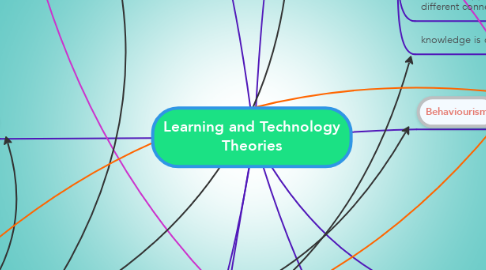
1. Constructivism
1.1. learning is constructed by building on previous knowledge
1.2. learning is active
1.2.1. problem solving
1.2.2. collaboration
1.3. always have previous knowledge that influences learning
1.4. students are responsible for their own learning
1.4.1. reflection
2. Cognitive Load
2.1. working memory
2.1.1. can handle 7 (+/- 2) items at a time
2.1.2. overload- too much to process, unable to build schemas
2.2. long term memory
2.2.1. unlimited
2.2.2. assists working memory
2.3. schemas
2.3.1. memory structures of connections in long term memory
2.3.2. written by working memory
2.4. automation- working and long term work together for well developed schemas
2.5. types of loads
2.5.1. extraneous- working memory cannot build schemas
2.5.2. intrinsic- irreducible complexity of interactions in working memory
2.5.3. germane- effortful learning resulting in schema and automation
2.6. chunking information
2.7. repetion
3. TPAK
3.1. Pedagogical
3.1.1. ex. classroom management
3.2. TPACK website
3.3. Conent
3.3.1. ex. knowing the water cycle
3.4. Extension of Shulman's PCK
3.5. Technological
3.5.1. ex. knowing how to use a Smart Board
3.6. The interaction of different types of knowledge in the classroom
3.6.1. you can cross over anywhere, TPK, PCK, TCK,
3.6.2. aiming to connect all knowledge in TPAK
4. Philosophy of Teachnology
4.1. Your philosophy on the role of technology in the classroom
4.2. How technology benefits and/or hinders your teaching
4.3. What technology based skills, ex. digital literacy, need to be incorporated in your lessons
4.4. How you use technology in your classroom and to what purpose
4.5. Can be a written statement, like your philosophy of teaching
5. Connectivism
5.1. for digital age
5.1.1. using technology to share connections
5.1.2. using a variety of media
5.2. integration of cognition and emotion
5.3. learning is a process of creation and decision making
5.3.1. blog for reflection
5.3.2. organization of knowledge
5.3.3. problem solving
5.4. learning has a goal
5.5. knowing how to find information rather than just knowing it
5.5.1. how to build networks
5.6. learning happens through many different connections
5.6.1. Personal Learning Networks
5.7. knowledge is current
5.7.1. good information vs bad
6. Behaviourism
6.1. learning as a response to stimuli
6.2. learn skills for later in life
6.3. learning in manageable blocks
6.4. positive and negative reinforcement
6.5. direct instruction
6.5.1. practice and repetition
6.5.2. learning is passive
6.5.3. demonstration of new material
6.5.4. structured lessons
